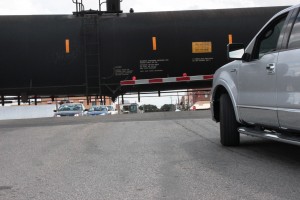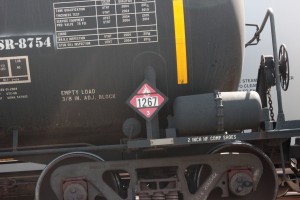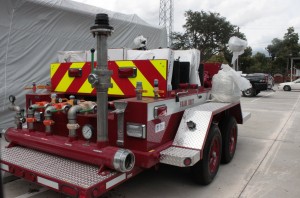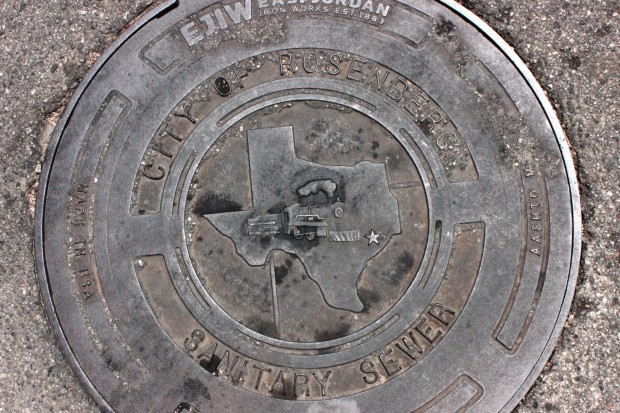As Tank Cars Roll Through, Texas Towns Prepare for Accidents

Dave Fehling / StateImpact
Petrochemical tank cars rolling through Rosenberg
In Rosenberg, even the manhole covers have a train insignia on them. Railroads are the town’s heritage.
In this city 20 miles west of Houston and at the edge of South Texas, three rail lines converge. Add to the trains all the trucks the cross the town’s south side on the Interstate 69 corridor.
It all makes this small city a big hub of transportation. But should something go wrong, the firefighters who’d be first to arrive weren’t sure they’d be prepared.
“One of our major concerns was being able to suppress the vapors if there was a fire. And we identified that as a high risk,” said Darrell Himly, Rosenberg’s assistant fire chief.
It’s a risk the county didn’t want to take. Not only is rail being used more to haul crude oil from the booming oil fields of South Texas, there’s also more petrochemical shipments passing through as refineries expand along the Gulf Coast, giving Rosenberg officials more reason than ever to wonder “what if”.
A Lack of Crucial Equipment
It was a concern only heightened in July when a runaway “oil train” torched a town and killed dozens of people in Canada. Then just two weeks ago, the Federal Railroad Administration said it was investigating how oil produced using hydraulic fracturing contained substances that might be linked to “severe corrosion” on the inside of tank cars and in valves and fittings.

In a rail yard in Houston, a tank car for crude oil as identified by "1267" placard
But it was actually months ago that Rosenberg firefighters and other members of the Fort Bend County Hazardous Materials Coordination Committee had detected the “high risk” in one of their first lines of defense. Federal safety guidelines recommend foam as one of the best ways to fight fires or suppress vapors of crude oil and other petroleum products. Trouble was, the county didn’t have the equipment to make and dispense the foam. It would have to depend on the equipment being sent from Houston.
“And if you add traffic into that — it could be a couple hours before we’d see that resource get here,” said assistant chief Himly.

Dave Fehling / StateImpact
Foam trailer purchased with federal grant by Fort Bend County Emergency Management
Trailer-mounted foam units cost about $85,000. Fort Bend County officials say they applied for and won a Federal Homeland Security grant that paid for two of the trailers, one for each side of the county.
“This puts that resource right in our hands that we can not only protect Rosenberg and Fort Bend County, but maybe some of the surrounding counties that don’t have that resource,” said Himly.
A Waiting List for Training
In October, a dozen of the county’s firefighters will travel to the Transportation Technology Center in Pueblo, Colorado. They’ll attend classes in how to handle rail tank car accidents. The massive training facility is a partnership between the Federal Railroad Administration and an industry group, the Association of American Railroads.
Asked if they were getting more interest lately from first responders concerned over rail accidents, the center’s director of hazardous materials training, Mike Cook, said they have not. Instead he said there has been a steady increase in enrollment with the center now training some 2,000 emergency personnel annually.
“We have a substantial waiting list even at this point for emergency responders that want this training,” said Cook.

Dave Fehling / StateImpact
Manhole cover with Rosenberg's locomotive insignia
